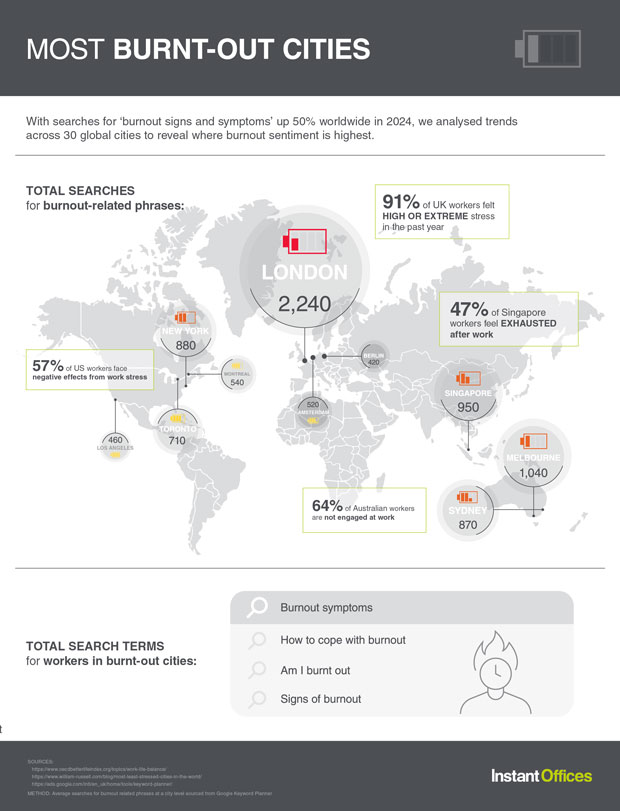Study reveals most burnt out cities globally as searches for burn out are up 50% overall in 2024

The things we Google can reveal a lot about how we feel. With searches for ‘burnout signs and symptoms’ up 50% worldwide in 2024, Instant Offices have analysed trends across 30 global cities to reveal where burnout sentiment is highest.
To find cities with the highest interest in burnout, Instant Offices researched Google searches at a city level for:
- Burnout symptoms
- How to cope with burnout
- Am I burnt out?
- Signs of burnout at work
The research shows Londoners have the highest burnout sentiment, followed by Melbourne and Singapore: Data shows that 91% of Brits have faced “high or extreme levels” of pressure or stress over the past year, and one in five UK workers needed to take time off work in the past year due to the impact of this stress on their mental health. Instant analysed the search behaviour of employees worldwide to find the most burnt-out cities, and London tops the list, followed by Melbourne, Singapore and New York.
Data shows that 91% of Brits have faced “high or extreme levels” of pressure or stress over the past year, and one in five UK workers needed to take time off work in the past year due to the impact of this stress on their mental health. Instant analysed the search behaviour of employees worldwide to find the most burnt-out cities, and London tops the list, followed by Melbourne, Singapore and New York.
In both Singapore and New York, a culture of overwork is taking its toll. 47% of workers in Singapore feel mentally and/or physically exhausted at the end of their workday, and more than two in five workers are finding it increasingly difficult to find motivation to do their work. In the States, workplace stress is also at worrying levels, with 57% of US workers experiencing negative impacts from work-related stress, including emotional exhaustion, lower productivity and lack of motivation.
Despite Australia’s reputation as a laid-back country, two major cities from Down Under – Melbourne and Sydney—made it into the top five. This is likely due to the phenomenon of the “Great Australian Burnout.” A recent Gallup study showed that 48% of Australian workers experience daily stress, and 64% are not engaged at work.
These are the top 10 cities globally Googling terms around burn out:
CITY BURNOUT SENTIMENT (SEARCHES PER MONTH)
London 2240
Melbourne 1040
Singapore 950
New York 880
Sydney 870
Toronto 710
Montreal 540
Amsterdam 520
Los Angeles 460
Berlin 420
So how can you spot and stop burn out?
Defining the symptoms
The World Health Organisation recognises burnout as an “occupational phenomenon” resulting from chronic, unmanaged workplace stress. According to the WHO, three dimensions characterise burnout:
- Energy depletion or exhaustion
- Feelings of negativity, cynicism or increased mental distance from one’s job
- Lower professional efficacy
Top causes
These are the factors that UK workers say cause them the most stress:
- 54%: A high workload or increase in unpaid tasks
- 45%: Regularly working unpaid overtime
- 42%: Feeling isolated at work
- 40%: Worries about redundancy/job security
- 38%: Taking on additional paid work to cope with the cost of living crisis
- 31% Bullying or intimidation by colleagues
Lifestyle stressors like poor sleep, poor physical health, and financial worries also contribute to burnout among Brits.
Know the signs
Are you burnt out or on the path towards it? Recognising the signs of burnout is important so you can address the problem before it worsens. Common signs of burnout include:
- Difficulty concentrating
- Less sense of pride in your work
- Losing sight of your goals
- Loss of motivation
- Frustration and irritability
- Unexplained headaches or muscle tension
- Fatigue
- Changes in appetite or sleep habits
Five tips for coping with burnout
- Take care of your physical needs. A healthy diet and regular exercise will boost energy levels and help you cope with stress.
- Talk about it. Discuss your workload with your manager, and try to find ways to reduce or redistribute the work. Talk to your loved ones about your feelings, and ask for their support. You may also want to talk to a counsellor or mental health professional.
- Take a tech break. Set time aside each day to completely unplug. Turn off your phone and laptop, and recharge by relaxing or doing something creative.
- Prioritise. Have a clear sense of which commitments are most important to you. Say “no” to demands on your time that take low priority, so you can say “yes” to your high-priority commitments.
- Practise relaxation techniques. Yoga, meditation and deep breathing all combat stress and help your body to relax.
Flexible working arrangements can help
Working arrangements also affect UK workers’ burnout experiences. While 25% of Brits working in a fixed office location said it was a contributing factor, only 16% of home workers and 14% of hybrid workers said the same. This shows how embracing a hybrid working model can significantly reduce the risk of burnout compared with a traditional workplace setup.
Visit Instant Offices to find out more about flexible offices for hybrid working
Add your comment

- Catering 1
- Construction 39
- Contracts, Projects, Bids 19
- Energy Management 103
- Engineering, Maintenance 623
- Estates, Property 36
- Events 1
- Facilities Management (main) 278
- Front of House 1
- Hard Services 54
- Health & Safety 1
- HVAC 218
- Management 2
- M&E 224
- Operations 81
- Procurement 19
- Sales & Marketing 4
- Soft Services 3
- Sustainability 1


